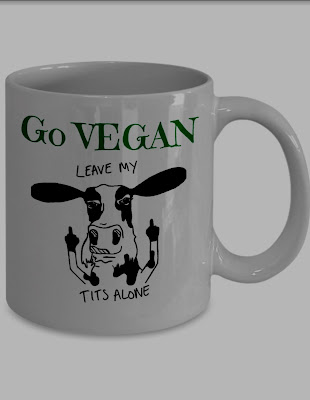Although I am male, I still have an opinion on this subject and will be putting my thoughts down in due course.
 There are probably still people out there who believe that dairy cows are effectively milk machines, and simply have to eat grass to produce a daily quota of milk. No, the reality is that in the same way as lactating humans have to have a baby to produce milk, a milk supply that eventually dries up, cows too have to give birth.
There are probably still people out there who believe that dairy cows are effectively milk machines, and simply have to eat grass to produce a daily quota of milk. No, the reality is that in the same way as lactating humans have to have a baby to produce milk, a milk supply that eventually dries up, cows too have to give birth.Unfortunately parenthood is not the celebration that in most cases, it is for humans. Cows are effectively raped and artificially impregnated with humans having a hand in the process. I will leave the logistics of this process to your imagination, but in short, semen needs to be obtained from a bull and it is then forced into the cow. The cows are restrained in what the industry refers to as "rape racks" whilst she is artificially inseminated.
Some farms still use the old fashion method of leaving the cow with a bull or two to have their merry way with her. There is no magic and as we grow ever more conscious of how sentient and intelligent these animals are it surely is time for this to stop. Rape can start from as young as 15 months of age, and is repeated over and over again until the cow is no longer deemed to be productive and then she is sent to the slaughterhouse. A cows natural life span is around 20 years, but this is usually cut short at about 5 years when she is no longer profitable to the farmer.
After giving birth the calf is often physically dragged away from its mother so that it does not take her precious milk destined for coffee shops, and the cheese board. This is an extremely distressing time for both mother and calf who will cry out in desperation as they are torn away from each other.
For one moment put yourself in that cows position. You have been raped, you have just given birth and your child is physically removed from you and you can do nothing about it. You have no say in the matter and no rights. To rub salt into your inflamed wounds, you will shortly be raped again and the whole process will start again as the milk you are producing for your offspring is taken from you everyday until it dries up, by which time you will be giving birth again. Your only release will be to be carted off in a lorry to a slaughterhouse and stunned with a bolt through your head before being hung up by a chain and having your throat cut. A cows life is far from dignified and as a man it makes me weep, so quite how it makes a female feel who I am sure can relate to the cow to a greater extent than I ever could as a male.
I am very interested to obtain views from women on this issue, so please provide your thoughts in the comments section below. I haven't even covered the exploitation yet and terrible system of pain and torture that hens are put through so that humans can consume their eggs. Do we simply overlook the fact that these non human animals have emotions, feel pain and fear and the females of the species have their bodies and reproduction systems violated for the greet of human animals.










